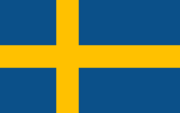 I’m now back from my fortnight in Sweden where I kept my word to give up Coffee House for a fortnight. There’s something about the country that makes it a lodestar for left and right, and the reasons why hit you as you travel around. Here are a few of my notes:-
I’m now back from my fortnight in Sweden where I kept my word to give up Coffee House for a fortnight. There’s something about the country that makes it a lodestar for left and right, and the reasons why hit you as you travel around. Here are a few of my notes:-
1. At a café in Birkastan (an area of Stockholm, not a breakaway Islamic republic) I bumped into Johan Norberg one of my favourite writers. I urge anyone who hasn’t heard of him to read his small but powerful book In Defence of Global Capitalism. He’s been having some fun at Naomi Klein’s expense recently and his article “The Klein Doctrine” is published by the Cato Institute, where he’s now a senior fellow. When Norberg quit Timbro, he said on his blog that he wanted to spend his time sitting in cafes reading The Economist. This is exactly what I found him doing last week. Stockholm has a vibrant intellectual scene where liberal thought flourishes (producing the likes of Norberg and Frederik Erixon and publications such as Neo). Perhaps this is why its conservative governments implement such imaginative and much-copied legislation on the rare occasions that they get into power.
2. Stockholm’s privately-run underground is about to go 24 hours, the latest innovation from Connex (now renamed Veolia). Privatising the underground is seen as too right wing for Britain, but not Sweden which is perhaps the most socialistic country in the world. And who can complain? Any Londoner using the Swedish system can only marvel at its cleanliness, punctuality and just to cap thing off, the ability to get a mobile signal underground. If London Underground ran all night, I imagine that night time attacks on women would go down dramatically. Ken Livingstone jacked up black cab fares in the evening so more drivers now work, but while there are now more taxis on the street few can afford them. Every night in London, you can see women ushered into the cars of strangers shouting ‘minicab’. If Boris could get London’s tube running till 3am, never mind 24 hours, he’d score a great victory for street safety.
3. It is currently the season for “crab parties” in Sweden, where one consumes lots of wine and tiny amounts of shellfish. It’s not uncommon to find a bottle of pure alcohol made from potatoes or whatever plonked on the even at company awaydays. As the tax and restrictions on booze are seen as unfair, people take law (and brewing) into their own hands. A by-product of state control is a vibrant black market that is far harder to regulate.
4. Immigration is growing issue, especially in Gothenburg and the south, but the Swedes have managed integration far better than Britain has. (I am slightly biased, in that my wife’s mother was an asylum seeker who stopped by Stockholm en route to Canada. Given shelter and language lessons by the Swedes, she stayed.) One of the most striking sights here is the Swedification of immigrants. There is certainly a Swedish style: beards are making a comeback, men with gelled-back hair, women with long hair and a strikingly similar fashion sense. You can stand in Stureplan and watch this Swedish “type” but now coming in all shapes, sizes and colours.
5. I read Fishing in Utopia by Andrew Brown recently. It is worth buying just for the beautiful and accurate descriptions of Sweden (where the author lived in the 1980s, until writing for The Spectator corrupted him). Two extracts:
“On a map, or from the air, the set east of Stockholm almost all the way into Finland looks as if God had crumbled biscuits into it – but, being God, had used granite instead”.
Spot on. And this:
“People talk of ‘putting the world to rights’ when they converse, but only in the white nights of St Petersburg or Stockholm does it seem to the talkers that the world is coming right as they speak.”
His book captures Sweden better than any I’ve read.
6. That said, Brown’s thesis that Sweden was somehow “destroyed” when it moved away from socialism is bunkum. Yes, Swedes elected governments who allowed independent operators to run everything form schools to drug addiction centres and leftwing hearts may be breaking all over the rest of Europe as a result, but nine million Swedes are better off. That’s why the elegiac tone of Brown’s book got to me. Sure, Sweden has its problems–just ask Norberg–but who benefits from the pro-market reforms it has made? The poor, whose children suddenly have a choice of independent schools to attend. Women, who can take a safe underground home all night. And even the drug addicts, who get private clinics that only the rich can afford in Britain. Sweden is perhaps the most left-wing (and high-taxed) country in the free world, yet Swedes do not find any moral outrage in private firms running their underground or hospitals as long as the outcome for the user is the best it can be. So yes, it’s still social democracy – but, alas, not as Britain knows it.







Comments